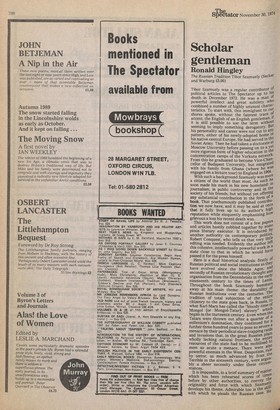Scholar gentleman
Ronald Hingley
The Russian Tradition Tibor Szamuely (Seeker and Warburg £5.00) Tibor Szamuely was a regular contributor of political articles to The Spectator up to his, death in December 1972. He was a man of powerful intellect and great subtlety who combined a number of highly unusual characteristics. To start with, this immigrant to our shores spoke, without the faintest trace 0,1, accent, the English of an English gentleman, n it is still possible to use the term without seeming to imply something derogatory. But his personality and career were not cut to anY pattern, either of his newly-adopted home or his native central Europe. He had served in the Soviet Army. Then he had taken a doctorate at Moscow University before passing on to a Yet more rigorous form of higher education in the concentration camps of the Vorkuta network. From this he graduated to become Vice-Chal_1; cellor of Budapest University, but emigrate' with his family from Ghana (where he Was engaged on a lecture tour) to England in 1964. With such a background Szamuely was more a citizen of the world than most. As such he soon made his mark in his new homeland: in journalism, in public controversy and in the society of his friends, but without yet offeri,llg any substantial contribution in the form of a book. That posthumously published contribution we now have, and it may be said at once that it fully lives up to its author's high reputation while eloquently emphasising how grievous a loss his recent death was. This work does not consist of a few papers and articles hastily cobbled together by solll„e pious literary executor. It is introduced oY another authority on contemporary politics, Robert Conquest, who tells us that very editing was needed. Evidently the author left this cohesive, intellectually powerful work ill 3 state close to that in which he would have passed it for the press himself. Here is a dual historical analysis: firstly of Russian political and social institutions as they have evolved since the Middle Ages; 8%1 secondly of Russian revolutionary thought an organisation from the Decembrists in the early nineteenth century to the times of Lenin' Throughout the book Szamuely hammers( away at his main theme: the durability ° Russian institutions over the centuries. The
little
tradition of total subjection of the entire citizenry to the state goes back, in Russia, tof what Karl Marx has called the "bloody time oh Mongol [or Mongol-Tatar] slavery" whic began in the thtrteentn century. Even when the Tatars were thrown out after a quarter of a millenium's domination, they continued for further three hundred years to pose so severe!' menace by their periodical slave-trapping raids. and invasions that, in the great Russian Phu0 wholly lacking natural frontiers, the entire_ resources of the state had to be mobilised t° meet so acute a menace. There were ais,° powerful enemies in the West. Despotism, rin by terror, as much advanced by Ivan to` Terrible in the sixteenth century, were argue" bstlaYncaessheer necessity under these circurn` It is impossible, in a brief summary of matters , which has been rehearsed scores of tilll,e„ before by other authorities, to convey tr originality and force with which Szaindely develops his theme. Admirable too is the le with which he pleads the Russian case. _slitnys far more respect for the country and its roPle than do those foreign experts and travellers whose attitude is sycophantic. APPalling conditions, as Szamuely points 4t, have made Russian life more miserable ca n most non-Russian life. And yet, paradoxisilY, they have also bred that unreasoning duirmr-patriotism which is so puzzling a ,aracteristic of the country. As Szamuely s.."°wa, such patriotism could take the form of eaxtreme support for the ruling Tsar-Emperor ' snd the Imperial state system. However, in a .snciety so organised that only revolutionary `ansPiracy could provide a serious outlet for 1)t)litical opposition, love of country could also .Lake the form of attempting to slaughter the innPerial family and overthrow the entire rev system. Tracing the history of volutionary thought through Herzen, the Men of the Sixties, Nihilism, the People's Will _and so on, Szamuely shows how the idea of a rolent revolution from below gradually took ',told. That revolution was not to be controlled nY the common people in whose name it was tnade, since they were considered far too stupid of d ill informed about their true needs. Instead P011t f that a small, closely-knit party of disciplinedal conspirators would take all the
u_ecisions and establish socialism by dictatorial methods after seizing power by coup cretat. ere The result of all this endeavour has been the
ation of a revolutionary state which has syerthrown Tsarism more in name than in fact, ilnee so much of the old tradition is enshrined !the admittedly much more severe new order. aa, nr b. ei turasery of political scapegoats, the fiction that
authoritarian governmental decrees !Ise as the result of popular pressure, the ban
or close regulation of foreign travel, the gregat10n of foreigners on Russian soil, the Practice of hastily translating and disseminating works by Western writers which give a tsheerningly disparaging picture of the West — all t„ese were, with various qualifications, feah'rea of the Old Russia just as they are of the ,e, And Catherine the Great, for example, had 11.1)erw own fellow-travelling Russia-fanciers in oltaire and Diderot, who were ready to rttison all their liberal beliefs, lock, stock and ,arrel, for one smile from the sovereign: a 'sokretaste of the pro-Stalinist antics of a Bernard naw or an H. G. Wells. njhis is, as the above reflection reminds us, a book for Western Russia-fanciers': those on the whole, take the Russian's at the frrentlin-sponsored valuation. They often do so ki:/rn ignorance, of course, but sometimes from wledge, as Szamuely shows us in his e'vell-rnerited but all too gentle strictures on ertain Western non-Marxist historians. e There is no work known to me which 11veYs certain vital aspects of the country ,., °re forcefully and more convincingly: albeit jlt without minor blemishes, No doubt L'zaMuely would have removed these had he een. able to revise the text himself: such errors r_as the reporting of Nicholas I's 'suicide' as a fact earther than a speculation, and the incorrect use olit.be phrase "of all the Russias" as part of the `Ing Autocrat's title.
a,Since Dr Szamuely died so recently I wish to "c-, a briefp ersonal note. We met soon after his fa,C,154Ption of residence in England in 1964, but ,,,"` some reason became friends only in the last s'rm3nths of his life: remarkably close friends, I o, old like to think, though we communicated an'Y by long-distance telephone. We seemed to ogee pretty well on world politics and on most er things, with only one reservation. He had faith than I do in the potential capacity of a 'lined Western opinion to make headway rogainst the Russia-fanciers. On this and on t„arlY other topics the dying man — as he later o'''rned out to be — projected a vitality, eetinlistn and concern truly heartening. Of his ann he spoke very little, for that would not f:ve been his style. Tibor was both gentle and i,:rnlidable: a rare combination, and one which "sPired great respect and affection.











































 Previous page
Previous page